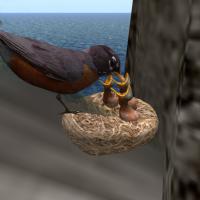We easily recognize “people’s needs” and distinguish them from our own needs. How complicated are our own needs?
To handle another’s distress we need to be centered to deal with it. Most people can’t be centered in their own distress. If all you needed to do was attend to your own needs, how busy would your life be?
Very, you would have to hunt, kill, build a fire, cook, build a shelter. Would you not yourself soon be eaten? Perhaps. Humanity has few gifts of a strictly physical nature that would allow it to survive in this world with other competition from predators.
If there were no compassion, we would need to have hundreds of babies like insects do. At one time humans did birth many more children than they do today, and some still do, but the recognizable need is long past. Why is that?
We have better medicine now. We have better medicine why?
Without compassion, there would be no medicine. If you got injured or sick, you would just die. Though it did have its dark side. The arts of the assassin and poisoner took shape alongside those of medicine. Martial artists in Asia had a reputation for great compassion. How could this be when the core of their life’s work involves practicing forms of combat?
The reason the two were linked was both philosophical and practical. It’s said that the hand that strikes also blocks, and the martial arts schools, even those not linked to a monastery, had a reputation for keeping the peace and being disciplined agents of that as well. They would fight a danger to their community so that no one else would have to. But, their studies of combat also equipped them with insights into the body, both how to disable it and how to heal it. They used their knowledge to heal themselves, but often acted as doctors for their communities as well.
Compassion involves a form of knowledge or it isn’t possible. Knowing oneself and others. So where is the dividing line between knowledge and compassion? Is perception the same as knowledge?
Perception is a bit more theoretical maybe. If I see a cookie, that is theoretical?
You can know that someone is suffering and be apathetic, or actually care enough to attempt to relieve that suffering, which would be compassion. I would agree, but why would we care? How is it even possible?
Perception is seeing? Seeing or otherwise detecting, yes.
We see ourselves in that person’s position. Like my mother would always say, “How would you like it if someone did that to you?” Yes. The core question of compassion is that.
It’s enlightened self-interest, perhaps. An awareness of the interconnectedness of all things. And exactly, on some instinctual level we feel that we are a part of the life that goes on around us. We intuit that things that happen in our world should matter to us.
Compassion is simply what comes from a bond. A baby’s cry will always prompt people to give the baby some attention. They do that yes, and in their awareness of the baby they often give it attention even when it does not cry. Compassion runs deeper than situational awareness. We have a medical tradition in the west that is noticeably different from eastern medicine. In what way is it different?
The west treats pieces vs. the whole? Can you have compassion for a kidney? How about a liver? An eye?
I think you can. Not eating something that damages a kidney would be compassion, for example. Perhaps with a deeper perception than most show today, no? And a great portion of our health problems arise because people show not one ounce of care for their organs.
Your thoughts are welcome. Be well friends.
Travis Saunders
Dragon Intuitive
~science,mysticism,spirituality~

